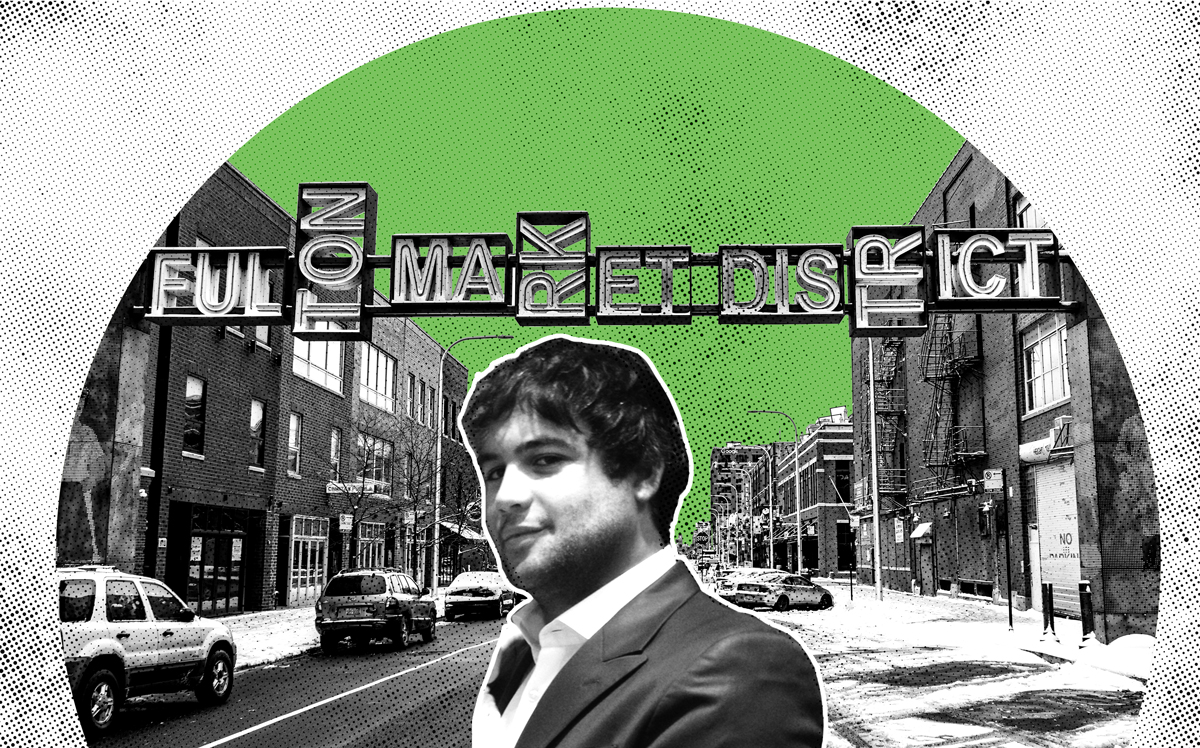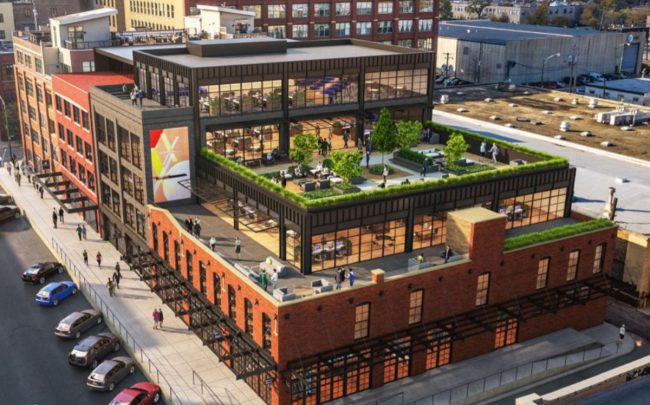Trending
Fulton St. Companies’ Alex Najem, the “largest smallest developer” in Chicago’s hottest ‘hood
Co-founder talks about competing alongside the likes of Sterling Bay and Shapack Partners, and how his 3-year-old firm is laser-focused on Fulton Market.

Alex Najem got his first taste of Fulton Market as a broker for Cedar Street Companies, when the development firm acquired and later sold a portfolio of four office and retail buildings.
That was a strategy and a neighborhood Najem would return to after co-founding Fulton St. Companies in late 2017 with Ross Babel and David Mazzella. Over the last two years, the firm has focused exclusively on the booming West Loop area, acquiring seven properties with six planned projects — five commercial developments and a 500-unit residential complex at 1325 West Randolph Street.

A rendering of 1100 West Fulton Street
Backed by Oak Brook-based Huizenga Capital Management, Fulton St. Companies projects include converting a century-old fire station at 114 North Aberdeen Street; and a historic building at 1100 West Fulton Street, where furniture company Herman Miller plans to take 45,000 square feet. The firm has also won approval for a hotel on a vacant plot at 1043 West Fulton Street, but it is still considering an office development there. Construction will begin in July.
Najem said his firm will maintain its focus on Fulton Market, eyeing properties on the western edges, which have become targets for investors. “We believe Fulton Market is its own little city,” he said. Najem sat down with The Real Deal to discuss the future of resi development in the booming district, how his company can thrive alongside competitors like Sterling Bay and Shapack Partners, and why he thinks the real estate cycle is still in its early innings.
This interview has been edited for length and clarity.
Why did you decide to plant the company’s flag in Fulton Market?
Over time, we believe that all the streets [in Fulton Market] will have an identity. We like that you can walk the entire neighborhood in 20 minutes. We also like that office [space] is spread out all over the neighborhood.
What about residential development?
In the beginning phase of Fulton Market, residential was banned north of Lake Street, which kind of forced a development wave of office north of Lake and a residential boom south of Lake.
We believe that residential will eventually be allowed north of Lake [and] that the neighborhood is going to have a good balance of daytime population, comprised of office, residential and retail, as well as hotels.
We also initially liked Fulton Market because we knew it was going to attract high-end retailers, trendier boutique hotels and bigger restaurant names from around the world. We believe River North is more of a commercial, suburban area that’s become quite cheesy, and Fulton Market has been selective of the type of tenants moving in there. There aren’t a lot of chains in the neighborhood and with fewer developers controlling most of the sites, they’re really able to decide what to put in certain buildings.
What’s it like sharing a neighborhood with two of the developers credited with transforming Fulton Market?
Andy Gloor [Sterling Bay] has been a mentor of mine for many years and Jeff Shapack [Shapack Partners] has a great eye for design and the ability to bring in out-of-state tenants that help build Fulton in a different way other than office, with Soho House and the Hoxton. I thought that being here with two groups that have a really good eye for design and the ability to attract like global tenants and brands, that’s kind of why I even came over here in the first place.
There’s a great synergy between the many different groups in the neighborhood. I think Fulton St. Companies is probably the largest smallest developer in the neighborhood. We actually own over 700 feet of frontage in the Fulton Market Historic District, so I think we actually have the most frontage in the district, but the smallest buildings.
Since you launched two years ago, what kind of growth have you seen in Fulton Market?
When I was in Cedar Street Companies [2013 to 2017], there was Soho House and now there are about eight hotels that have been built, approved or planned in the neighborhood. I don’t know the exact numbers but new residential units are in the thousands. We’ve seen condo sales go from $300 per square foot to $1,000 per square foot. We’ve also seen a number of developers from all over the world coming into the neighborhood. So where there was, you know, three developers, there are now 10.
What will attract people to the neighborhood in the future?
We believe that the tenants looking to be in Fulton Market want to have their own identity and a lot of great buildings on side streets have distinct characteristics and create their own brand within the neighborhood. Some have courtyards, some have terraces, some of patios, some have been around for 100 years. We believe that the tenants coming into the neighborhood on the retail side or the restaurant side don’t necessarily need to be on the main street. We did a pop-up with Glossier out of New York and they had 1,000 people a day on average visit 114 North Aberdeen, which is on a side street in mid-block. That’s kind of why we think that every street is going to be a good street in Fulton Market.
Why are you considering a spec office building where you originally planned to put a Pendry hotel?
There are too many proposed hotels. But it seems that office is a no-brainer given the recent expansion of Google. With the multiple sites that we have, we kind of want to wait and see what happens with the hotel market in Fulton Market specifically before we do that. It still could be the Pendry. We’ll know soon. But either way, we will start construction in July of this year.
Has the uncertainty surrounding property taxes impacted your decision-making at all?
No. We believe Chicago stands on its own as truly the third coast. Chicago is a necessity for corporations …People talk about Denver and Austin and all sorts of other up-and-coming cities where it would take decades to build the infrastructure that Chicago has. It’s just not something that we think companies like Google, Amazon, Facebook, or any other high-profile corporation that’s growing rapidly is going to want to wait around for.
How have interest rates impacted your developments?
We’re more confident in our developments and them being successful in this cycle. Everyone thinks we’re in a later inning. I believe we are in the early innings of the cycle. We don’t believe interest rates are to increase for the foreseeable future…We think they’ll stay low for the foreseeable future. I don’t think they’ll start to increase for another five years.
When will development in Fulton Market reach its limit?
Well, because there’s only a limited supply of land now and the demand is far greater, we think that it’s going to push west of Ogden, just expanding Fulton. I think that that will be what happens. I don’t think it will reach its full potential until we get to Western Avenue but bound by Hubbard and Madison.




